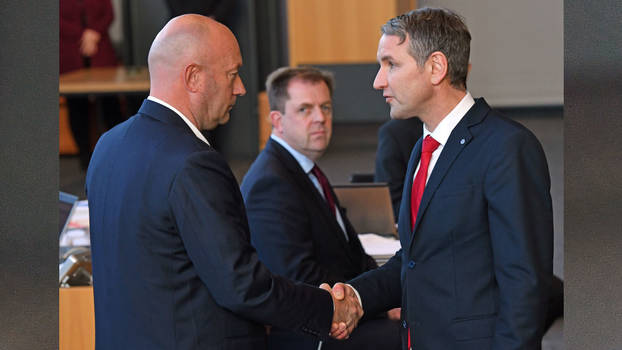
The election of Thomas Kemmerich (FDP) as the new Minister President of Thuringia on 5 February 2020 represents a political breach of historic dimensions. For the first time, a Minister President will come to power with the votes of the nationalist Alternative für Deutschland (AfD). It became clear during voting in the state parliament that the decision was no coincidence, although no formal coalition negotiations between the FDP and Christian Democrats (CDU) have been held so far.
Kemmerich was elected with a one-vote majority with support from the AfD, CDU, and FDP. In the state elections on 27 October 2019, Die Linke became the strongest force in Thuringia for the first time with 31 percent (+3) and achieved its best-ever result in a single state. The CDU, on the other hand, lost a significant amount of support (–11.8) and only ended up in third place behind the AfD (23.4 percent). The CDU had once been able to win more than 50 percent of the vote here, but now, under party and parliamentary group leader Mike Mohring, it was only enough for 21.7 percent—a disastrous defeat. In the weeks following the election, the party quarrelled and appeared divided.
Paul Wellsow runs the Rosa-Luxemburg-Stiftung’s regional office in Erfurt, Thuringia.
Due to a loss of electoral support for the SPD and the Greens, however, there was no longer an absolute majority for the continuation of the red-red-green coalition. Instead, the three parties reached a new coalition agreement in order to continue their work as a minority government.
In the first two rounds of voting for the Minister President in the Thuringian state parliament on 5 February 2020, Bodo Ramelow ran for red-red-green and Christoph Kindervater, a non-partisan mayor, for the AfD. Ramelow received 43 votes—one vote more than red-red-green has members in parliament. Kindervater received 25 votes, three more than the AfD itself, with 22 abstaining. In the second ballot, Ramelow received another vote from either the CDU or FDP camp, and the AfD candidate received 22 delegates.
For the first two rounds, 46 votes would have been necessary to win. In the third round of voting, a different procedure applies: whoever receives the most votes wins. For this ballot, the FDP announced that Kemmerich would run for election after he had not run in the first two rounds. Kindervater received no votes, Ramelow won 44 and Kemmerich took in 45. During the election it became clear that this vote was no coincidence, but that there must have been a coordinated attempt to vote out red-red-green and Ramelow. Apparently, the CDU and FDP deliberately and purposefully calculated the votes of the AfD—possibly even in consultation with the right-populist party, as AfD MP Stefan Möller implied, stating that “red-red-green had no idea that we were capable of such shady moves.” Shortly after the elections, Kemmerich sought to introduce his cabinet, but then postponed the move.
Their goal seems to be to form a “black-yellow” (conservative-liberal) minority government. Kemmerich, whose party just barely passed the five-percent threshold in the state elections with only a few votes, does not have a majority with the CDU either. This can only happen if the AfD supports the alliance in future parliamentary decisions. It is unclear whether agreements have already been reached on this. If the FDP and CDU want to govern together in Thuringia in the future, they will have to warm up to the AfD in order to obtain parliamentary majorities.
What is clear is that the electoral alliance between the AfD, CDU, and FDP that has emerged here represents a historic breach in Germany’s political levee. The AfD is being further normalized and integrated into practical national politics. It was the kingmaker in this election and its political weight has thus increased significantly. The new state government is a government by grace of the Thuringian AfD’s state leader, neo-fascist Björn Höcke. This will have practical consequences—for all spheres of politics. The demarcation to the right, which has been taken for granted in the Federal Republic thus far, has appeared increasingly shaky for some time. But on 5 February 2020 the CDU and FDP decided, for reasons of gaining power, to cancel the political cordon sanitaire against the far-right.
A historical parallel ought to be recalled in this context: the first government with Nazi Party participation came to power in Thuringia in 1930. The CDU and FDP have now joined forces with the nationalist AfD, breaking a major political taboo. It must not remain without consequences.